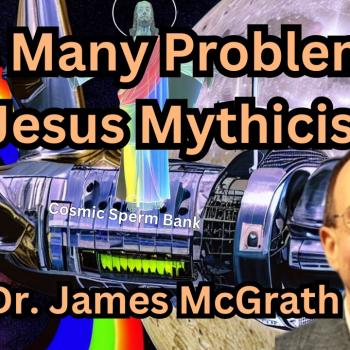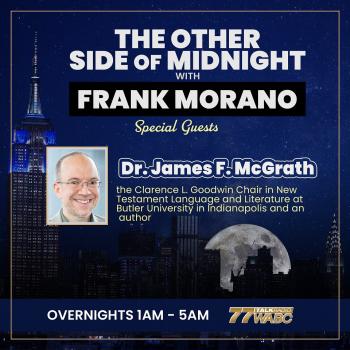The video above should let you watch the Richard Carrier interview as it is happening now.
I’m liveblogging it. Carrier is now talking about people sowing doubt about biology, for instance. But that is precisely an example of people manufacturing controversy about a consensus. He says that consensus has value. So he is trying, it sounds to me, to have his cake and eat it too. When can you trust consensus and when can you not?
The host borrows from Massimo Pigliucci, making the point that a layperson is in no position to challenge a consensus.
Carrier responds by claiming that laypeople need to be able to ensure that scholars are doing what they claim to. He mentioned fraud in academic journals – but I would say that only other experts can detect and deal with this, not laypeople.
Carrier claims that any layperson can see that the methods used in the study of the historical Jesus are flawed! He compares historical study to alchemy and astrology!
The example of antivaxxers claiming that doctors are biased in favor of vaccines is mentioned.
Carrier says that laypeople can figure out which authorities are lying often and which hardly ever.
Carrier claims that experts discussing a matter of Greek grammar should be able to demonstrate their points by reference to English!
Brahe mentions the issue of a “clash of experts,” and Harry Collins’ book Are We All Scientific Experts Now. He also mentions Chris Mooney’s review of the book. All of this points to the need to rely on the community of experts to assess whether any one expert’s argument is valid.
Carrier says it is easy for a laypeople to tell that one side is misrepresenting things, for instance in the debates on climate science. That is itself dubious, and ignores the fact that even would-be skeptics get duped by things. Carrier says that things get more difficult when one moves outside the sciences, and that in history, laypeople can tell when a minority view is stating the facts and the consensus is wrong.
Carrier rightly challenges the claim that we have as much or as good evidence for Jesus as for Alexander the Great. But he claimed that a credentialed professional historian of Jesus said that, and doesn’t specify whom, although he hints that it was Dale Allison. I wonder who, if anyone, actually said this, but certainly if it turns out to be not a mainstream historian but a conservative Christian voice, then that doesn’t look good for one’s impression of Carrier. I checked Google Books and found Josh McDowell, not scholars.
Brahe raises the right questions, and points out that Carrier himself has said that he can’t help cranks. But if cranks aren’t persuadable, then how can he assess whether he is a crank?!
He also backtracks inasmuch as he points out that most laypeople have not learned logic and so cannot assess what experts say.
Brahe points out that, if someone starts using Google to fact-check things, they will end up relying on the consensus, on other experts!
He also points out that, given the division of labor among experts, even experts don’t have the confidence on their own abilities that Carrier says laypeople should have.
As a result, I’m not persuaded by Carrier’s viewpoint. What do you think?
Brahe mentioned me, and Carrier responded by saying that I am a good example of bias, that I have a “Christian agenda,” and that I’ve made multiple false statements. 🙂 By all means, fact check what I’ve said, and what Carrier has – if there is something that Carrier and I would, I hope, agree on, it is that you should not just trust one scholar’s claims. Indeed, Carrier says as much in the interview. I can think of instances where, in informal blog interactions, I have made errors. I hope that Carrier is not pretending never to have done that. Indeed, in this interview he says that even reliable historians get things wrong occasionally, and so occasional errors cannot be the basis for deciding who is trustworthy. But that would seem to be all the more reason to look to the consensus.
The key issue is said to come down to how you decide whom to trust. If someone makes false claims often, then you should stop trusting them. But mythicists have been shown to be at best inaccurate time and time again. So even Carrier’s statements about how to vet authorities would eliminate at least most mythicists. Please, go take a close look at what they say, and apply to them the critical thinking and methods of logic that Carrier says are appropriate.
Carrier agrees in the end with Brahe’s concern about the possible way that one could take his argument to support conspiracy thinking. Laypeople who have not trained themselves cannot evaluate a scholarly consensus.
The quote that Brahe offers from Carrier’s book remains a good one. As I quoted from his book when I reviewed it, “an effective consensus of qualified experts constitutes meeting an initial burden of evidence” because “it is far more unlikely that an incorrect argument would persuade a hundred experts than that it would persuade only one; and it’s far more unlikely that it would persuade any expert than that it would persuade even a hundred amateurs” (Proving History, p.29).
Brahe also points out that there is a disproportionate representation of crazy among mythicists, which seems to be a powerful argument against mythicism, if Carrier’s arguments in this interview are right. Carrier mentions Earl Doherty as having come up with a good theory and having argued it really well! Oh my goodness! Doherty’s book is so full of inaccuracies that, if Carrier thinks it is something insightful, that calls into question his own critical thinking abilities and knowledge of the relevant historical texts and data.













